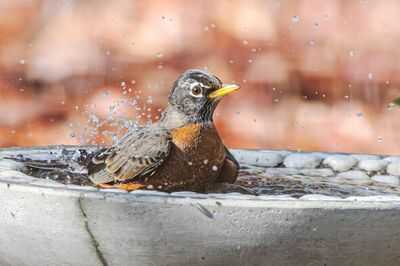Autumn can be a quieter time for garden birds for numerous reasons. As the bustling activity of spring and summer transitions to autumn's softer tones, countless nature enthusiasts across the UK observe an unusual quietness settling over their outdoor spaces.
The morning birdsong becomes barely audible and our feathered friends appear to have almost disappeared entirely. If you've been pondering "Where have all the birds gone?" you're certainly not the only one. You might presume they've departed for warmer destinations.
Whilst some certainly have migrated, it's actually a blend of natural occurrences and seasonal shifts that means familiar species, like robins, are simply experiencing a calmer, less conspicuous period.
However, those birds that stay put can still gain from your assistance, especially regarding sustenance. The RSPB advises we should continue providing bird food and water "on a regular basis" throughout autumn and winter.
There's one particular food type it recommends: "Birds need high-energy, high-fat foods during cold weather."
High-energy and high-fat foods include the following, which birds love:
- Suet
- Peanuts
- Sunflower seeds
- Mealworms
"Mealworms are a key for robins, they absolutely love them," explained Sue Morgan, CEO of SongBird Survival. "But I think if you went with sunflower hearts and mealworms... robins would really like those."
There are several points to remember when providing food for birds in your garden, particularly concerning cleanliness and preventing illness: "Always adjust the quantity given to the demand, and never allow uneaten foods to build up," said the RSPB. Ensure to clean up old feed and check for signs of disease.
If you have a bird bath, it's crucial to keep it clean regularly. Earlier this year, the RSPB halted the sale of its flat bird tables due to concerns that they could be aiding in the spread of lethal diseases to finches.
Why you may notice fewer birds in autumnThe annual moult: After the strenuous breeding season, adult birds are worn out. Their feathers, essential for flight and insulation, are frayed and ragged.

To gear up for the challenges of autumn and winter, birds completely replace their feathers. This process is incredibly energy-consuming, making birds more susceptible and less likely to spend time out in the open.
"Moulting is a physically demanding time for birds," the RSPB explains. "They need to conserve energy, so they become much quieter and spend more time hidden amongst vegetation, making them less conspicuous."
Nature's larder is full: During spring and summer, birds are highly visible at feeders because natural food sources can be scarce, and they require a constant supply of energy to feed their young. However, the autumn months sees a surge of natural food.
Berries are ripe, seeds are plentiful on plants, and insects are still abundant. With a natural buffet available, birds spend less time queuing at your feeders.
They disperse into hedgerows, woodlands, and garden shrubs, where they can forage for a diverse diet.
"Wild food sources like berries, nuts, and fallen fruits are at their peak in autumn," says the British Trust for Ornithology (BTO). "Meaning birds don't have to rely as heavily on supplementary feeding."
Birds are maturing and getting ready to migrate: Juvenile birds, hatched during spring, are also becoming independent.
They're no longer reliant on their parents and are starting to venture into new areas. This "dispersal" means they could relocate from their natal garden, leading to fewer recognisable visitors overall.
Moreover, some of our summer residents, including swallows and house martins, are actually gearing up for their extensive journey southward. Whilst their exodus is quite apparent, it forms part of the wider seasonal transformation.
Many of our year-round birds, nevertheless, are simply settling in and concentrating on survival.
How you can help birds in autumnAlthough your garden might appear more subdued, the birds remain present, merely being more cautious.
You can assist them during this challenging time by:
Providing water: Fresh, clean water for drinking and bathing is crucial, especially as natural puddles may dry up.
Leaving wild areas: Resist the urge for a perfectly tidy garden. Piles of leaves, seed heads, and undisturbed shrubs provide vital shelter and food sources.
Offering high-energy foods: Continue to put out quality bird seed, suet and fat balls, as these provide essential energy for moulting and winter preparation, especially when natural food supplies begin to dwindle later in autumn.
You may also like

Celtic match halted just minutes into match as players fume and make desperate plea

'Dementia can start in your legs': Bengaluru neurosurgeon explains how inactive muscles can trigger cognitive decline

Liquor worth Rs 2.06 crore seized ahead of Diwali in Ahmedabad

Ayurveda offers natural ways to prevent Osteoporosis and strengthen bones: Ayush Ministry

The London Underground line that was abandoned halfway through building






